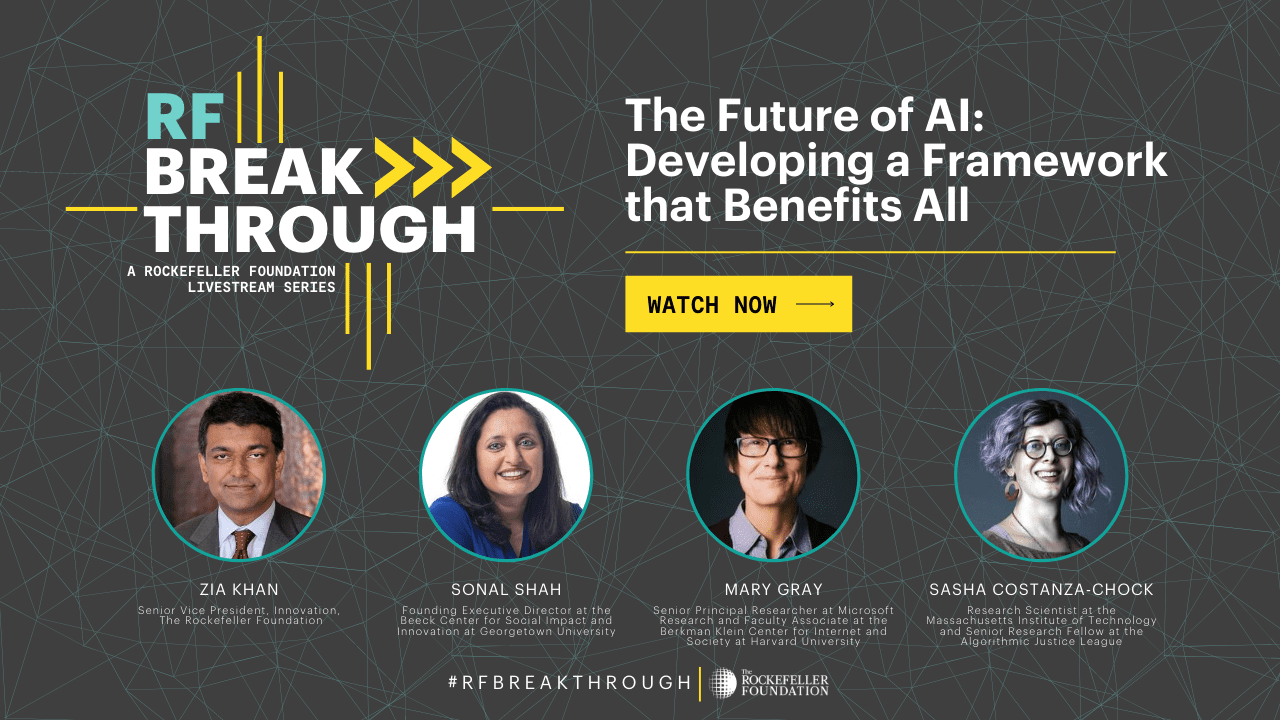As the Fourth Industrial Revolution evolves, frontier technologies such as artificial intelligence (AI) are reshaping our economies, societies and the environment. AI is opening up economic opportunities with companies large and small empowered to grow their businesses. From a social perspective, AI provides a host of benefits. Machine learning algorithms power cost-effective healthcare diagnostics for rural communities who previously had no access to doctors. AI allows teachers to spend more time on actually teaching students while automating their administrative functions. And from an environmental perspective, AI-powered intelligent transport systems are making our cities smarter and greener.
However, the wave of optimism surrounding the transformative potential of AI has been tempered by increasing concerns about potential negative impacts including an evolving digital divide, ethical concerns, and the future of work.
So, what should we do to harness AI for social good?
Digital connectivity is the precursor for AI development. However, half of Asia’s four billion plus people still do not have access to the internet. If this issue is not addressed, there is a risk of a new AI divide being built on top of the already existing digital divide. Ensuring inclusivity is essential for equitable future growth. In this respect, last mile internet connectivity should be a policy priority for governments and the private sector alike.
Data availability determines what problems are worked on and what populations are served. Data and technology can increase the speed, depth, and accuracy of analyzing a social challenge, pointing to solutions, partnerships, and innovative investments that can provide maximum impact. Thus, making high quality, reliable, representative, recent and annotated data accessible to innovators is a necessary precursor for feeding good, labeled training datasets into AI algorithms whose results benefit the most vulnerable communities. The Rockefeller Foundation’s Lacuna Fund, in partnership with Google.org and Canada’s International Development Research Centre is the world’s first such collaborative effort.
Governments need to upskill themselves and their citizens for a digital age. In Bangladesh, the government has committed to embracing this new direction and has made digitization a national priority. The government has also called for greater digital skills development of the youth to ensure their employability in any industry. The Government of Singapore offers adults personal Skills Future credit accounts which they can use to buy training. It also uses a mix of grant programs and tax incentives to encourage firms to invest more in low-wage workers, those most at risk from technological job displacement.
Governments need to direct AI investment to address social and environmental challenges. The digital revolution was very much led by the public sector. The economist Marianna Mazzucato brought this to light when analyzing Apple’s iPhone and Google’s search engine. Both these innovations benefited from state intervention. For the iPhone, many of the technologies–such as GPS, the touchscreen, and Siri–were funded by the U.S. government. Equally for Google, its seminal PageRank algorithm was funded by the National Science Foundation. And, of course, there’s the internet, another government funded technology, which backs up both these products. However, in Asia, the current technological revolution is accelerating at an exponential pace, fueled by private sector investment, particularly from the tech titans. So the question is, how might governments incentivize private sector AI development for social good?
Already we are seeing bold, innovative policy responses to this challenge. As examples, the Social Enterprise Act in Thailand provides support to enterprises with a core social objective, while in the Philippines, an inclusive business accreditation system has been developed–the first of its kind in the world–which provides tax incentives to businesses that provide valuable goods and services at affordable prices to poor and low-income people.
Since AI systems are designed by human beings with their own set of biases, when algorithms are applied to social and economic quandaries, they can perpetuate racism, sexism, ableism and other harmful forms of discrimination. Far too often algorithmic biases manifest as algorithmic harms, especially for marginalized communities. It is no longer about the technology alone, but the humanization of technology. Making AI ethical necessitates building awareness and educating developers of the pitfalls of an unbiased system. As The Rockefeller Foundation seeks to harness AI for social good, we are also working to mitigate harms. Earlier this year, we funded the Algorithmic Justice League to launch the Algorithmic Vulnerability Bounties to prevent, report and redress harms.
Today, we are at an inflection point in the way data and AI technologies are used. As AI-related technologies penetrate ever more aspects of society, the management of AI will be a societal challenge as well as a technical one. It is imperative for individuals, businesses, governments, nonprofits and philanthropies to come together to ensure there is a consolidated effort to prioritize ethical AI-led innovations that maximize social benefit and minimize social harm.
This piece originally appeared on Forbes on October 28, 2020, and reposted with permission.
Related Updates

The Future of AI: Developing a Framework that Benefits All
Tune into #RFBreakthrough, a don’t-miss live stream series highlighting urgent and innovative discussions with thought leaders and industry experts. For the second episode in the #RFBreakthrough series, The Rockefeller Foundation hosted a live stream discussion on how we can use artificial intelligence as a force for good during the pandemic and beyond, while also exploring […]
More